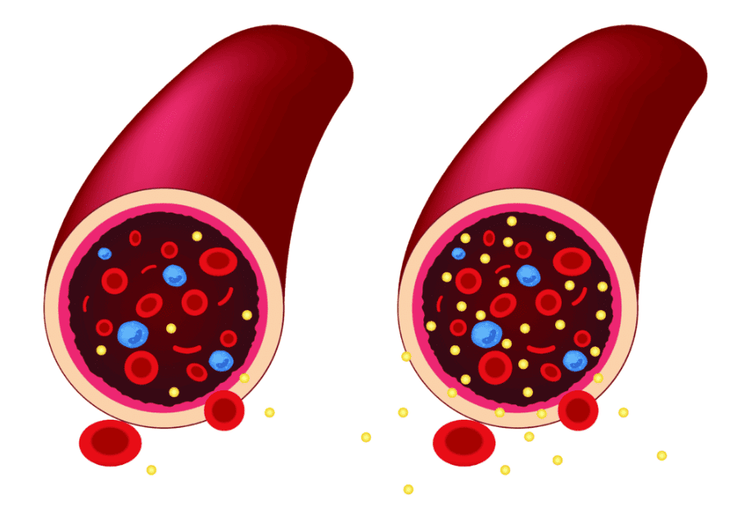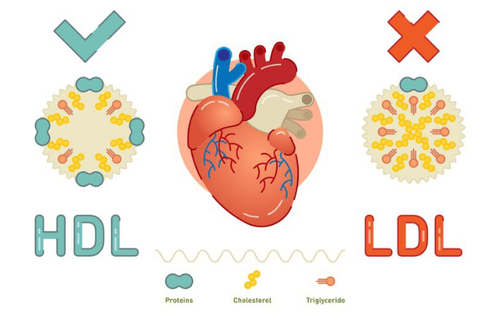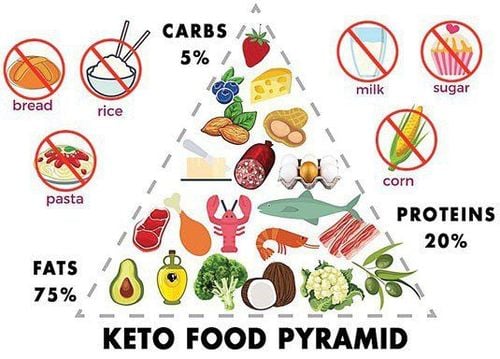This is an automatically translated article.
Posted by Master, Doctor Mai Vien Phuong - Department of Examination & Internal Medicine - Vinmec Central Park International General Hospital
The ketogenic or keto diet is a very low-carbohydrate, high-fat form of diet that has gained popularity in recent years. It has been shown to offer some impressive health benefits – including weight loss. So many people turn to this way of eating to achieve their weight loss goals.
The low-carbohydrate, high-fat ketogenic diet is a proven way to lose weight. It also has powerful benefits against type 2 diabetes and metabolic syndrome, and may even help treat cancer. Additionally, it has been used to treat epilepsy since the 1920s.
Here are 10 charts showing the many powerful benefits of the ketogenic diet.
1. It Can Help You Lose More Fat
More than 20 studies have shown that a low-carbohydrate or ketogenic diet can help you lose weight. The weight loss is often much greater than on a high-carbohydrate diet. In the graph above, the ketogenic group in the study lost more weight, despite the fact that their protein and calorie intake were equal to that of the non-ketogenic group.The ketogenic group was also less hungry and found it easier to diet.
This suggests that low-carbohydrate (low-sugar) or ketogenic diets provide a distinct “metabolic advantage” over high-carbohydrate diets, although this is still up for debate.
Conclusion: The ketogenic diet is effective for weight loss. It's better than a high-carbohydrate diet and may even offer a metabolic advantage.

2. Helps you lose harmful belly fat
Belly fat or excess belly fat is a serious risk factor for all sorts of metabolic diseases. This type of stored fat can increase your risk of heart disease, type 2 diabetes, and early death. Interestingly, the ketogenic diet is a very effective way to lose belly fat.
As shown in the chart above, the ketogenic diet reduces total weight, body fat, and belly fat more than a low fat diet. These findings were more pronounced in men than in women, possibly because men tend to store more fat in this area.
Conclusion: The ketogenic diet can help you lose belly fat, which is strongly linked to heart disease, type 2 diabetes and reduced life expectancy.
3. It can help you burn more fat during exercise
The ketogenic diet improves your metabolic flexibility and helps you burn stored body fat for energy, instead of glucose. The graph shows that runners who adapted to the ketogenic diet were able to burn 2.3 times more fat per minute during their workouts, compared with those who followed the low-fat diet.
In the long run, increased fat burning can provide various health benefits and protect against obesity.
Bottom Line: The ketogenic diet can significantly enhance your ability to burn fat during exercise.
4. It can lower blood sugar
Over the years, a high-carbohydrate diet and poor insulin function can lead to high blood sugar. High blood sugar can lead to type 2 diabetes, obesity, heart disease, and premature aging. Interestingly, the ketogenic diet can be very beneficial for people with diabetes and high blood sugar. As shown in the chart, eliminating carbohydrates from your diet can significantly lower blood sugar in people with high blood sugar.
Conclusion: The ketogenic diet is extremely effective at reducing blood sugar levels, an important marker of long-term health.

5. It strongly reduces insulin resistance
As with blood sugar, your level of insulin resistance is directly related to your health and risk of disease. This study found that the ketogenic diet significantly reduced insulin levels in diabetics, which indicates a reduction in insulin resistance. The ketogenic group also lost 12.8 lbs (5.8 kg), while the high carbohydrate group lost only 4.2 lbs (1.9 kg). Triglyceride levels decreased by 20% in the ketogenic group, compared with only 4% in the high-carbohydrate group.
Conclusion: The ketogenic diet will significantly reduce insulin resistance, one of the most important markers of metabolic health.
Blood triglycerides are an important marker of heart health and describe the amount of fat in your blood. High levels are associated with an increased risk of heart disease. The increased risk can be as high as 30% in men and 75% in women.
This study showed that the ketogenic diet reduced fasting triglyceride levels by 44%, while there was no change with a low-fat, high-carbohydrate diet. In addition, the amount of fat in the blood after the meal was significantly reduced, as shown in the chart above.
The ketogenic diet also improves other markers of metabolic syndrome. For example, it leads to more weight loss, lower triglyceride:HDL ratio, and lower blood sugar.
Conclusion: Despite its very high fat content, the ketogenic diet can significantly reduce blood triglycerides.
7. It May Increase HDL ("good") Cholesterol
HDL cholesterol plays an important role in cholesterol metabolism by helping your body recycle or get rid of it. Higher HDL levels are associated with a reduced risk of heart disease. One of the best ways to increase HDL is to increase fat intake in a low-carbohydrate or ketogenic diet. The ketogenic diet can cause a significant increase in HDL levels.
Bottom Line: HDL ("good" cholesterol) plays an important role in cholesterol metabolism and has been linked to a reduced risk of heart disease. The ketogenic diet can cause a significant increase in HDL levels.

8. Hunger perception is lower
When dieting, frequent hunger leads to binge eating or quitting the diet altogether. One of the main reasons low-carbohydrate and ketogenic diets are so beneficial for weight loss is the fact that they reduce feelings of hunger.
The study above compared the ketogenic diet to a low-fat diet. The ketogenic diet group reported that they were much less hungry, despite the fact that they lost 46% of their weight.
Conclusion: Hunger level plays an important role in successful dieting. The ketogenic diet has been shown to reduce hunger compared to a low-fat diet.
9. It can reduce seizures caused by epilepsy
Since the 1920s, researchers and doctors have tested and used the ketogenic diet to treat epilepsy. As shown in this chart, one study found that 75.8% of children with epilepsy following a ketogenic diet had fewer seizures after just one month of treatment. Furthermore, after 6 months, half of the patients had at least 90% reduction in seizure frequency, while 50% of these patients reported complete remission.
At the start of the study, the majority of subjects were malnourished and below normal weight. At the end of the study, all subjects achieved a healthy weight and improved their nutritional status.
One year after the diet, 5 of the 29 participants remained seizure-free, and some of the participants reduced or completely stopped their anticonvulsant medication.
Conclusion: The ketogenic diet can help reduce the frequency of seizures in children with epilepsy. In some cases, the diet can eliminate seizures altogether.
10. It can reduce tumor size
Medical interventions for brain cancer may not target tumor cell growth and often negatively affect the health and vitality of normal brain cells. This study compared a normal diet (shown as SD-UR) with a higher-calorie ketogenic diet (KD-UR) and a calorie-restricted ketogenic diet (KD-R). in mice with brain cancer.
The bars in the histogram represent tumor size. As you can see, the two tumors were reduced by 65% and 35% in the calorie-restricted ketogenic group (KD-R). Interestingly, no changes occurred in the higher-calorie ketogenic group.
Other studies in humans and animals show amazing benefits in fighting cancer, especially when it is detected early. Although research is still in the early stages, it is likely that the ketogenic diet will eventually be used alongside more conventional cancer treatments.
To summarize, the keto diet is a very low carb, high fat diet that has been shown to offer many health benefits, including weight loss. While the exact weight loss mechanism involved in this way of eating is still being studied, it appears that weight loss is due to a calorie deficit, reduced hunger levels, and water weight loss. Keto supplements can reduce hunger and help you transition into ketosis more quickly, although they should not be used to promote weight loss. While the weight loss benefits of the keto diet seem promising, it's important to consider its potential side effects, downsides, and lack of long-term research.
Please dial HOTLINE for more information or register for an appointment HERE. Download MyVinmec app to make appointments faster and to manage your bookings easily.














